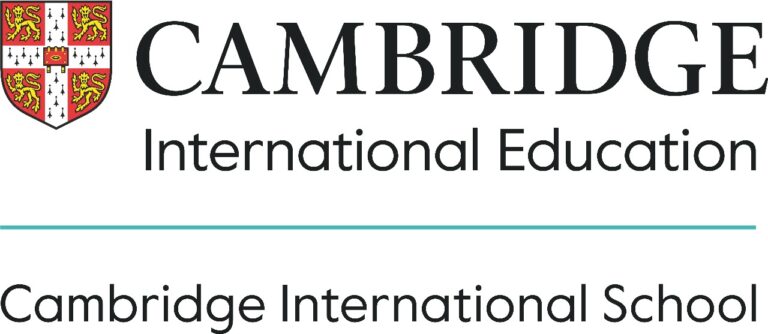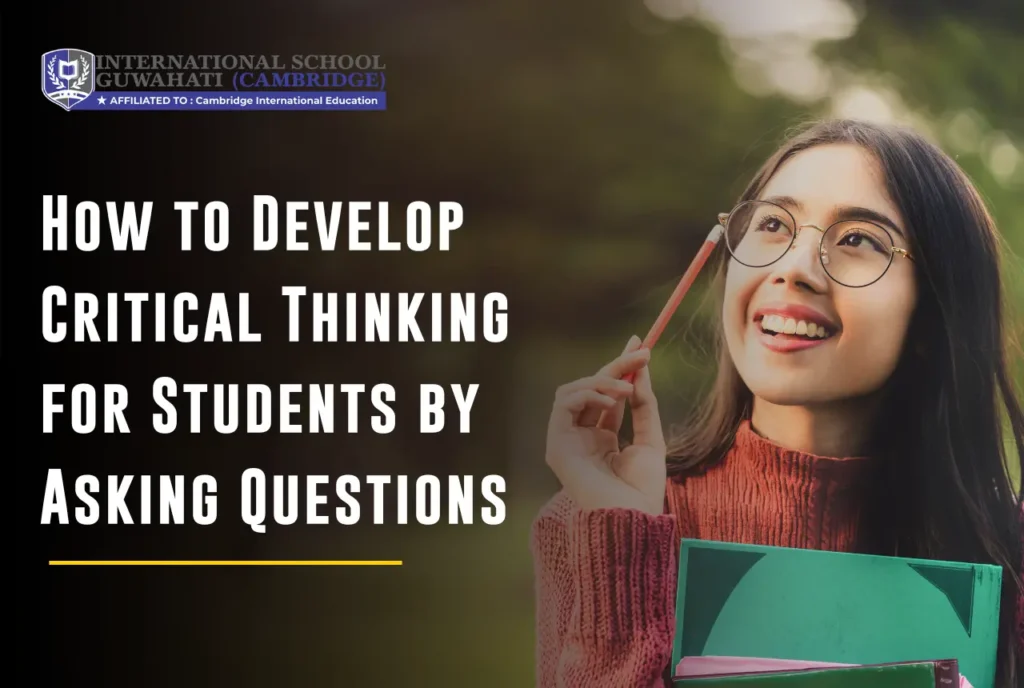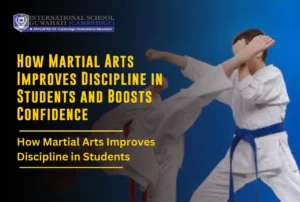![]()
Imagine a world where you can analyze information, solve problems like a pro, and come up with creative ideas. That’s the power of critical thinking! It’s all about asking the right questions and digging deeper to understand the world around you. Here’s why it’s important: critical thinking helps you succeed in school, make better decisions, and even innovate amazing things. Hence, in this article, we will talk about how to develop critical thinking skills for students through activities in school as well as at home.
How to Develop Critical Thinking by Asking Questions?

Critical thinking is like a detective kit for your brain. It involves analyzing information, figuring things out, and drawing conclusions based on evidence. So what is the key to unlocking this superpower? Asking questions! Here are different types of questions to get your brain buzzing:
- Open-ended questions: These don’t have a one-word answer. They make you think, like “Why is the sky blue?” These questions unlock greater comprehension and innovative thinking. They arouse curiosity since they cannot be answered with a straightforward “yes” or “no.” Instead, they stimulate us to examine information, consider other views, and generate new ideas.
- Probing questions: These dig deeper, asking for more details or explanations, like “What evidence supports that claim?”
- Clarifying questions: These help you understand better, like “Can you explain what you mean by that?” Asking clarifying questions allows us to gain a deeper understanding by confirming that we have not missed something. These inquiries merely request further information or rephrase what was previously stated to ensure our understanding of the material.
- Evaluative questions: These help you judge the worth of something, like “Is this source reliable?” They help you in determining the value, credibility, and possible biases of information. You may weigh evidence, avoid being misled by deception, and ultimately make stronger, more educated judgments by asking “Is this source reliable?” or “What are the potential downsides of this option?”
Don’t be afraid to question assumptions and biases too! Assumptions are things you believe are true without proof, and biases are your viewpoints that might cloud your judgment. Questioning them helps you see things from different angles.
Benefits of Critical Thinking in Students
Critical thinking is not just for professors and scholars. There are many benefits of critical thinking in students. Here’s how it helps you become a super student:
- Do Well in Your Exams: Critical thinking helps you understand concepts deeply, not just memorize facts. You can build strong arguments and solve problems like a champ!
- Make Smarter Choices: From picking the right college to planning your future, critical thinking helps you evaluate evidence, weigh options, and consider all angles before making a decision.
- Become a Creative Genius: Critical thinking encourages you to challenge assumptions and explore new ideas.
- Master Communication and Teamwork: Being a critical thinker makes you a better listener and communicator. You can argue your points effectively and learn from others’ perspectives.
- Lifelong Learning Capacity: Critical thinking fuels your curiosity and makes you want to learn more and more. It’s a skill that keeps your brain sharp throughout your life!
Critical Thinking Activities for Different Subjects

Asking questions can be an adventure in any subject:
- Science: Imagine you’re experimenting. What variables might affect the outcome? Is there another way to explain this result?
- History: Who wrote this document about a historical event? What might their bias be? Were there people with different perspectives?
- Literature: Why does this character act the way they do? How does the author use words to create a certain mood?
- Math: Formulas are cool, but why do they work? Can you solve this problem differently?
Teaching Critical Thinking Skills in Schools
Teachers can be your critical-thinking coaches! Here’s how they can help you develop this amazing skill:
- Open the discussion: In a student-centered classroom, you get to ask questions, share ideas, and have respectful debates with your classmates.
- Explore: Inquiry-based learning is all about asking your questions, investigating solutions, and discovering knowledge through exploration.
- Lead by Example: Teachers can show you how they approach problems, analyze information, and form conclusions. It’s like having a behind-the-scenes peek at critical thinking in action!
Critical Thinking Exercises for the Classroom
Ready to put your questioning skills to the test? Try these activities:
- Brainstorm a list of questions about a current event, a historical figure, or a scientific theory.
- Analyze an advertisement or editorial: Can you spot any biases, misleading language, or logical fallacies?
- Debate a controversial topic from different perspectives. Imagine you’re arguing for both sides!
- Problem-solving: Choose a real-world issue and create a solution backed by evidence.
- Step into someone else’s shoes! Role-play a scenario that requires critical thinking and decision-making.
Empowering Students to Ask the Right Questions

Critical thinking is all about asking the right questions, and students who can do this effectively are setting themselves up for success! Here are some ways to help them become questioning masters:
- Developing Questioning Stems: Give students a toolbox of open-ended prompts to spark their curiosity. Prompts like “Why?”, “How?”, “What evidence supports this?”, and “What are the potential consequences?” can guide them toward deeper understanding.
- Bloom’s Taxonomy to the Rescue: This technique helps students ask questions at different levels of thinking. Start with basic questions that test understanding (“What is the main idea?”), then move on to analyzing information (“How does this connect to what we learned before?”). Finally, encourage them to evaluate (“Is this source reliable?”) and create (“Can you design a solution to this problem?“).
- Self-Questioning: The Secret Weapon: Teach students to be their question detectives! Encourage them to reflect on their thinking process by asking themselves critical questions like “Do I understand this concept?”, “What are my assumptions?”, and “Is there another way to approach this problem?”. Self-questioning strengthens their critical thinking muscles and helps them become independent learners.
Bottom Line
Critical thinking is based on our analysis of the situation. So, the answer to the question- “how to develop critical thinking skills” is asking questions. So, students develop critical thinking skills when they ask questions instead of just accepting the answer like an axiom. So, students, put on your thinking caps and analyze every situation before making any conclusions.










